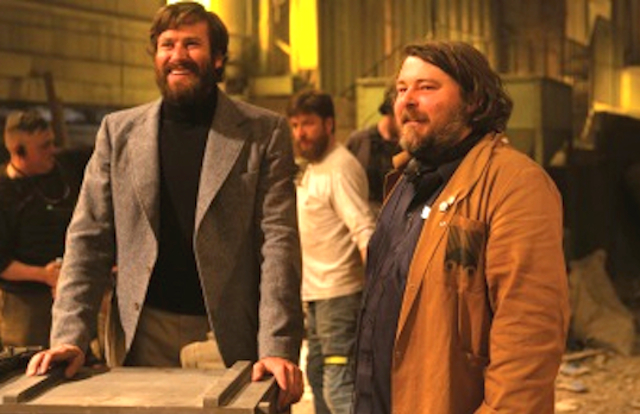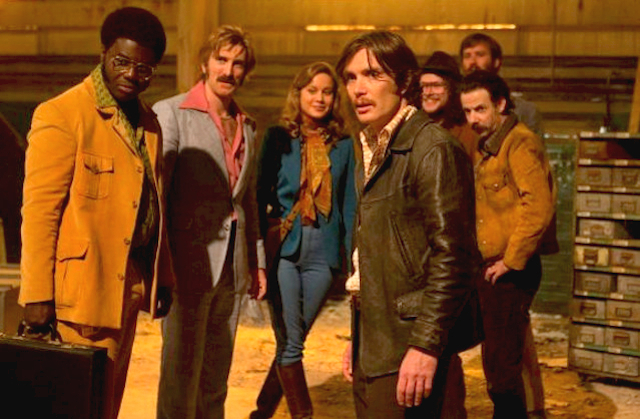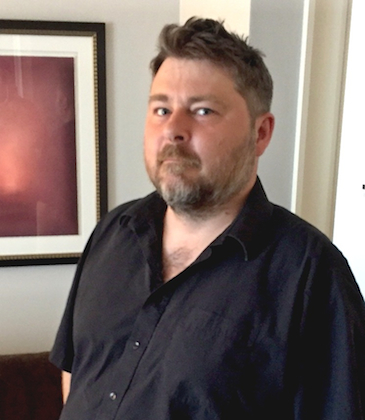CHICAGO – Patrick McDonald of HollywoodChicago.com appears on “The Morning Mess” with Dan Baker on WBGR-FM (Monroe, Wisconsin) on March 21st, 2024, reviewing the new streaming series “Manhunt” – based on the bestseller by James L. Swanson – currently streaming on Apple TV+.
Interview: Director Ben Wheatley Ignites His New Film ‘Free Fire’
CHICAGO – One of the more lovely examples of pure cinema – if that description can be given to a film with nearly constant gunplay – is in the upcoming release of “Free Fire.” Director Ben Wheatley (“High-Rise”) constructs a dark and funny scenario within one room, and fills it with symbolism and homage to other movies.
Set in 1978, the story was based on an article that Ben Wheatley read about Irish gun runners during the IRA conflict. His writing partner Amy Jump, who is also his wife, concocted a narrative that had the gun deal go bad. What follows is a shoot out that lasts in real time over the 80 minutes it takes place. With outrageous asides, pitch black comedy and some of more creative violence this side of Quentin Tarantino, “Free Fire” takes its place as one of the best films, so far, in 2017.

Armie Hammer and Ben Wheatley On Set for ‘Free Fire’
Photo credit: A24
British-born Ben Wheatley began as a short filmmaker and animator who came to prominence in the internet age. His early clip called “Cunning Stunt” attracted 10 million views, and his short animations and games on his website “Mr. and Mrs. Wheatley” was his entry into mainstream media and advertising. He started directing for TV in 2006, and made his first feature film, “Down Terrace” (2009), in eight days. He made three more features from 2010 to 2013, and got mainstream financing for his memorable adaptation – with Amy Jump – of “High-Rise” (2016), starring Tom Hiddleston.
HollywoodChicago.com got a expansive opportunity to talk to Ben Wheatley, who “High-Rise” actor Elisabeth Moss called, “a f**king genius… and he’s so funny.”
HollywoodChicago.com: This film is a cinema professor’s dream, with potential interpretations involving the afterlife, symbolic characters, society in general, war and western motifs. Did you have an interpretative feeling once you had a plan for the film?
Ben Wheatley: First, I look to bend with the actors to see what they’ve got, because you want the best out of them. We’ve hired them for a reason, usually because they’re f**king great, and you don’t want to step on that, and if they give you stuff, you want to use it. So this was the first time we did this, and probably the last time [laughs], but Amy was on set as we shot. She wrote a day ahead as the ideas formulated – she would see the what came out of a day’s shooting and go in the direction that was interesting.
I was also editing it live, it was coming out of the cameras and into the editing bay, so we had a control over the film that we’d never had before. After it was done, we looked at the original script and the basic story was still the same, there were just tonal shifts that occurred on set.
HollywoodChicago.com: The buy-in of character specificity was very important to the atmosphere that you were developing. How did you and Amy communicate those character specifics, and how much were you adjusting them on set?
Wheatley: There is a draft after the casting to rewrite the characters – for example, the Sharito Copley character wasn’t South African originally. We changed it when he came aboard, and it turned out great. The relationship between him and Babou Ceesay’s [African American] character wasn’t in the original script, because there wasn’t necessarily any ethnic specifics in the original story.
Those are the things that come up in casting, so we had to say ‘f**k, all right’ and deal with it. Because we write for the actors, we like to latch onto their real selves and write toward those characteristics. Sam Riley said it was as close as to a real version of him then has ever been, he’s really that wild person, although he is cast in mostly cool-cat roles. Armie Hammer has the screen persona of a matinee idol, and in our film he’s rangy, funny and kind of weird. We picked that out of him as well.

Cast Photo For ‘Free Fire’
Photo credit: A24
HollywoodChicago.com: The setting in 1978 is very important, both for your ironic use of the John Denver song, and the way people communicate. Since you were only six years old at the time it is set, what fascinates you about the 1970s that allowed for setting the film then?
Wheatley: The story is what pushed us there… the buying of guns in Massachusetts was the in the 1970s, and we wanted it around the era for it to make historical sense, even though it’s not leaned into too heavily, it’s there.
I remember the 1970s, I was a kid, and you talk about the ironic use of John Denver, but I happen to like that track [Annie’s Song] a lot. One of the images I had in the beginning was this truck driving indoors in a circle, and a guy heavily injured trying to steer the vehicle to stop it, and what would be the worst song to come on the radio? That was it.
You mentioned communications, and mobile phones have completely changed how we communicate. We had to step back to that time just to get free of that stuff.
HollywoodChicago.com: I mentioned war in the first question. The futility of the fire fight in the film does mimic the futility of war, especially in what became the motivation to escape the situation in the end. How do you think you’re defining futility in the stand-off depicted in the film?
Wheatley: It’s a rare film, if you look at it as a war movie, because you meet both sides. There is no black or white, good or enemy, because we used to seeing the good guys mow down as many faceless combatants as possible. This film is as close as it gets in showing both sides, and you think, oh shit, there is no backing down. There could have been an alternative reality where they calmed down and met in a bar afterward, because in a sense there was no reason for what transpired.
HollywoodChicago.com: What were the dynamics of special effects for the on-set action. What was necessary to get the realism of a real gun fight?
Wheatley: It was tough, but on set it was 98% practical. It was about using air mortars or pyrotechnics.
HollywoodChicago.com: Was it like the movie ‘Tropic Thunder’ where is was over done?
Wheatley: [Laughs] We had one of those, yes. We had long takes in the film, some over six minutes long. We were going for one of those, and a pyro went off, and it was [makes blowing-up noises]. Oh god, it was quite a dark moment on the set. It never happened again but the pyro guy was like ‘wow, sorry.’ [laughs] Realism was important. I wanted the fear in people’s eyes as they pulled the trigger. It’s a f**king firework in your hand and it’s horrible.
HollywoodChicago.com: What is your opinion of guns? Obviously you had to know more about them to construct the film. How do you view the gun culture of America?
 Director Ben Wheatley of ‘Free Fire’ Photo credit: Patrick McDonald for HollywoodChicago.com |
Wheatley: In the broadest sense, I think everyone would agree that it’s really horrific to be in a gun battle. [laughs] There is nothing contentious in expressing that point of view. No would accuse us of glamorizing guns in making the showdown realistic. We also tried to have the proper amount of ammunition, except for Sam Riley. To duplicate how many shots he fired, he would have had to have a sack on him filled with bullet clips. [laughs] Generally, we tried to make consequences for the use of the guns, and it was more realistic. It’s painful, brutal and scary.
HollywoodChicago.com: Both ‘High-Rise’ and ‘Free Fire’ have territorial themes, with violence becoming the ultimate solution. What fascinates you and Amy about the use of force to establish territory, and will it eventually lead – in your opinion – to human extinction?
Wheatley: Ha! I think for both of us – and I worry about talking for Amy – is that wafer thin skin of humanity versus society, and how quickly everything could turn to shit. I also think about the Civil War, and the Second World War, and how everyone thought it was just fine afterwards, but it wasn’t.
And on a personal level, we don’t think about our own deaths, because when people die it’s kind of their fault, and they’ve let the team down a bit by not being immortal. [laughs] That’s the outlook for us. Will it eventually kill us all? No, we’ll be fine, it will probably be a miserable cough that destroys us.
HollywoodChicago.com: You’ve worked with some real heavy hitter actors in your last two films. What do you observe about how someone commits to a role and how it affects them?
Wheatley: Well, for example, Tom Hiddleston in ‘High-Rise.’ The film wouldn’t have been made if it wasn’t for his commitment to it. He went to a dark and difficult place. – he really had a tough year with that and ‘Crimson Peak.’ I would have recommended doing a film about gardening after those performances. [laughs] If an actor commits properly to a role, they do a bit mad during a shoot. If they’re going to do that, they should balance themselves by doing a role as a yoga teacher.
HollywoodChicago.com: Finally, which character would you be in Free Fire, and why, and who would you want to eliminate the most?
Wheatley: I don’t know. The one that is most like me is Martin, the Babou Ceesay character, because he’s so boiling with f**king rage the whole time. [laughs] I like Sam’s character because he’s an agent of chaos, and I don’t believe he did anything that they said he did. He just likes to wind everybody up. Who to eliminate? I don’t know, I liked them all too much to do anybody in.
 | By PATRICK McDONALD |


